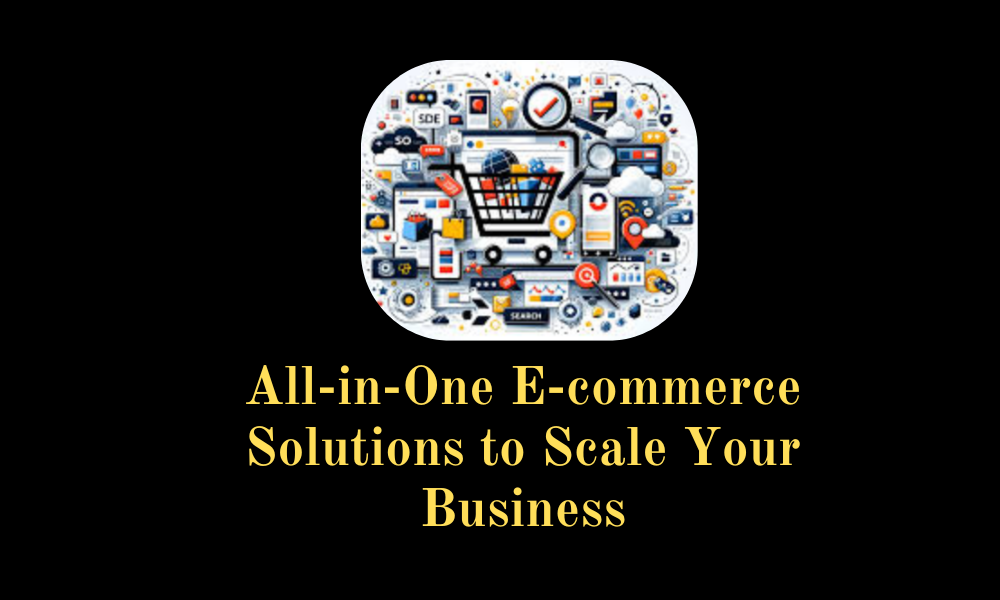All-in-One E-commerce Solutions to Scale Your Business
In today’s digital age, having a robust e-commerce presence is essential for businesses to thrive. E-commerce solutions offer a comprehensive suite of tools and services to help businesses sell their products and services online efficiently.

This article will devel into everything you should know about the e-commerce solutions
Table of contents
Benefits of All-in-One Ecommerce Solutions
All-in-One e-commerce solutions bring numerous benefits to businesses, including cost savings, streamlined operations, scalability, and enhanced customer experiences. These platforms integrate various functionalities like website design, payment processing, inventory management, marketing tools, and customer support, all in one place.

Key Features of All-in-One Ecommerce Platforms
- Website Builder: Easily create and customize your online store with user-friendly website builders.
- Payment Gateways: Secure payment processing integrations for seamless transactions.
- Inventory Management: Track and manage your inventory levels in real time.
- Marketing Tools: Utilize email marketing, SEO optimization, and social media integrations to reach your target audience.
- Customer Support: Provide excellent customer service with live chat, ticketing systems, and knowledge bases.
How All-in-One E-commerce Solutions Scale Your Business
By consolidating essential e-commerce functions into a single platform, all-in-one solutions simplify workflows, reduce manual tasks, and improve operational efficiency. This scalability allows businesses to handle increased sales volumes, expand product offerings, and enter new markets effortlessly.

| Benefit | Explanation |
| Simplifying Workflows | All-in-one solutions integrate multiple tools and processes, streamlining tasks and reducing complexity. |
| Reducing Manual Tasks | Automation features in these solutions eliminate manual data entry and repetitive tasks, saving time. |
| Improving Operational Efficiency | Centralized management and real-time analytics enhance decision-making and overall business performance. |
| Handling Increased Sales Volumes | Scalable infrastructure and robust features support handling higher transaction volumes without issues. |
| Expanding Product Offerings | Integrated platforms make adding new products easier, managing inventory, and updating product listings. |
| Entering New Markets Effortlessly | Features like multi-language support, global payment gateways, and localized marketing tools aid in expansion. |
Choosing the Right All-in-One E-commerce Solution
When selecting an all-in-one e-commerce platform, consider factors such as pricing, features, scalability, customization options, integrations with other business tools, and customer support. Conduct thorough research and choose a solution that aligns with your business goals and requirements.
- Pricing:
- Evaluate the cost structure, including monthly fees, transaction fees, and any additional charges for advanced features.
- Consider your budget and ensure the pricing aligns with your financial goals.
- Features:
- Look for essential features such as product management, inventory tracking, order processing, and payment gateways.
- Assess if the platform offers additional features like marketing tools, analytics, and customer relationship management(CRM) capabilities.
- Scalability:
- Determine if the platform can scale with your business as it grows, accommodating increased traffic, sales volume, and product offerings.
- Check for options to upgrade plans or add functionalities without major disruptions to your operations.
- Customization Options:
- Evaluate the platform’s customization level, including website design, branding elements, and checkout process customization.
- Ensure you can tailor the platform to match your brand identity and customer experience goals.
Implementation and Integration Challenges
While all-in-one e-commerce solutions offer many advantages, businesses may face challenges during implementation and integration with existing systems. It’s crucial to plan carefully, train employees, and ensure seamless integration to maximize the benefits of these platforms.
- Data Migration: One of the primary challenges is migrating existing data from legacy systems to the new all-in-one platform. This process requires careful planning and execution to ensure data accuracy and consistency across systems.
- Customization Needs: Businesses often have unique requirements that may not align perfectly with out-of-the-box features of all-in-one solutions. Customization needs can range from UI/UX tweaks to backend integrations, requiring skilled developers and thorough testing.
- Integration with Third-Party Tools: Many businesses rely on a range of third-party tools and services for various functions like payment processing, CRM, inventory management, and shipping. Integrating these tools seamlessly with the all-in-one platform is essential for a smooth operational workflow.
- Training and Change Management: Introducing a new e-commerce solution often requires training employees on how to use the platform effectively. Change management becomes crucial to ensure that teams adapt well to the new processes and workflows.
- Scalability and Performance: As businesses grow, scalability and performance become key concerns. All-in-one solutions must handle increasing traffic, transactions, and data volumes without compromising speed as well as the stability.
Future Trends in All-in-One Ecommerce Solutions
The future of all-in-one e-commerce solutions lies in advanced AI and machine learning capabilities, personalized customer experiences, omnichannel selling, and enhanced data analytics for better decision-making accordingly.

Conclusion
All-in-one e-commerce solutions offer a comprehensive and scalable approach for businesses looking to establish a strong online presence, streamline operations, and drive growth. Moreover, implementing them helps you to dominate the competitive digital market.
Secondly, by leveraging the right platform and implementing best practices, businesses can effectively scale their e-commerce operations and stay competitive in today’s digital landscape.
Read more : How Web Development Optimizes Your Site
FAQS
All-in-one platforms offer cost savings, streamlined operations as well as scalability, and enhanced customer experiences in one integrated solution.
These solutions simplify workflows, reduce manual tasks, improve operational efficiency, handle increased sales volumes as well as product offerings, and aid in entering new markets effortlessly.
Consider pricing structure, essential features, scalability options, customization capabilities, integrations with other tools as well as quality of customer support.
Challenges include data migration complexities, customization needs, integration with third-party tools, training requirements, and ensuring scalability as well as performance as the business grows.

Alex Mitch
Welcome to my blog! With over 10 years in digital marketing , I’ve seen its incredible impact on smaller businesses. Join me as we explore how digital marketing can grow your audience and boost your business. Whether you’re an experienced entrepreneur or just starting out, you’ll find practical tips and insights to enhance your digital marketing strategies.





